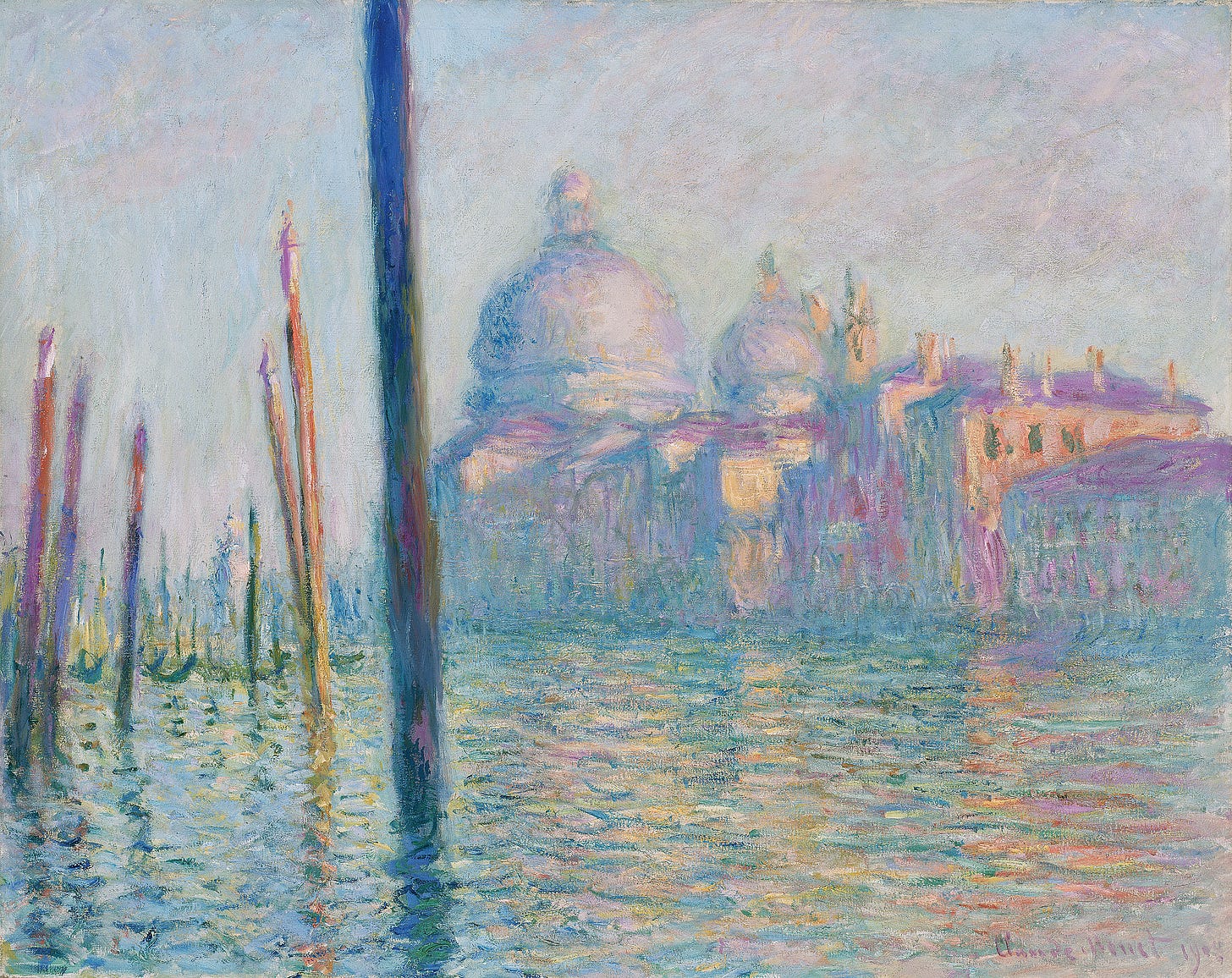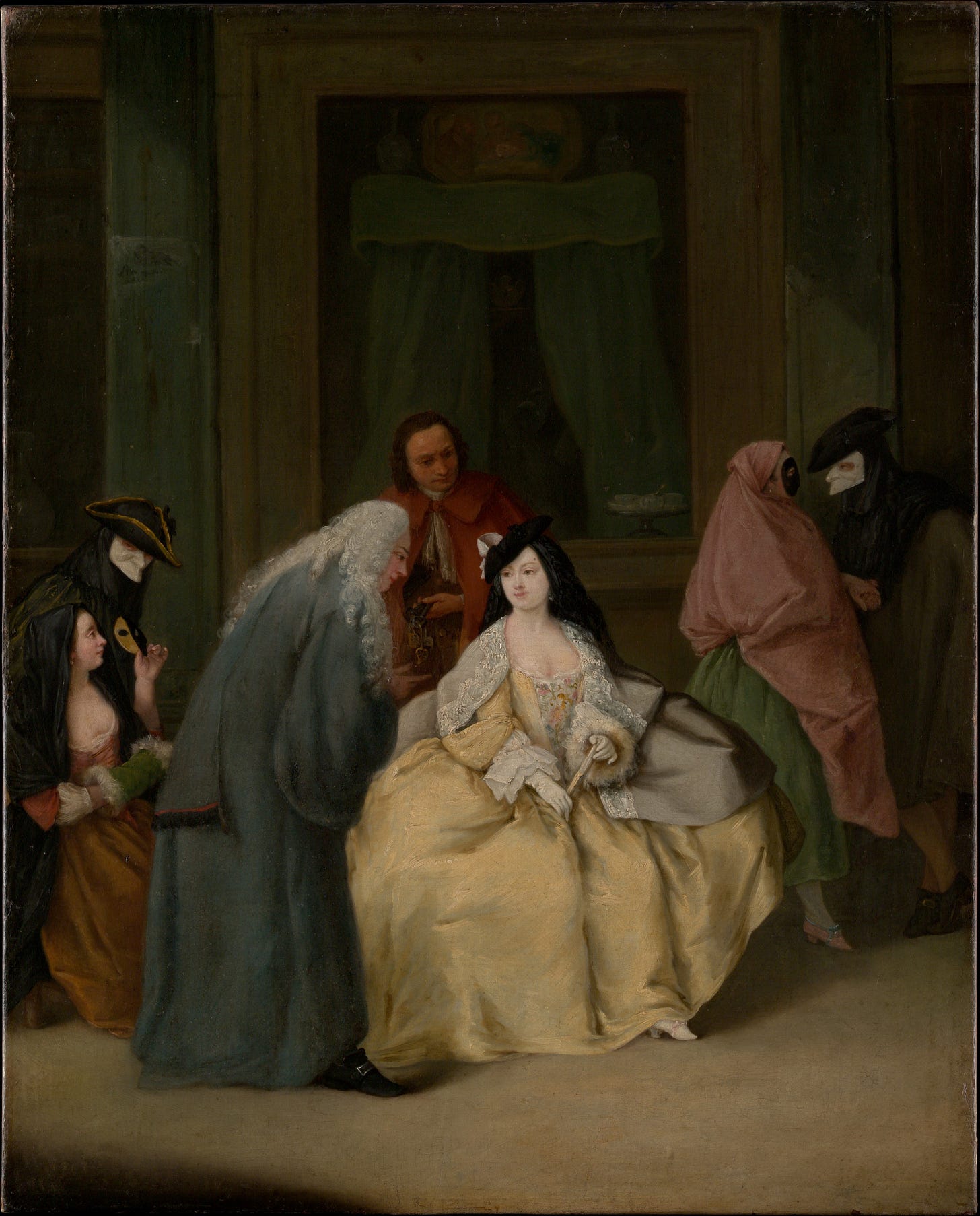on carnival
Every year I go to the carnival. There are many carnivals, of course: in Rio, of course, and in hill towns in Germany and Italy, and if you call it Mardi Gras instead there is the carnival in New Orleans, and what all these carnivals have in common is that they culminate on Shrove Tuesday with drinking and dancing and sweaty gaiety and then, on Ash Wednesday, they end. My carnival is in Venice.
There are a few details I could provide about my particular carnival, but they would not translate into much about what carnival is. We – which is to say a group of friends, and some strangers, and some others groups of friends that bear tangential relation to our group of friends, and some people who are strange to them but some of whom will inevitably become fixtures by next year – go to Venice, unless we already live there, and we go to parties that are sometimes at palazzos and sometimes at each other’s AirBnBs, and because it is Venice most places are both; we dress up in costumes that are either historical or fantastical, which we have either made or have had made, or have thrifted or scouted or bought off Facebook Marketplace or from one another. There is prosecco. There are afterparties. Some of us go home when it is already light.
It is, in other words, a great deal like a great many other rituals: it is a little like a theatrical summer camp, a little like a funhouse mirror inverse of Burning Man (replace free-wheeling, libertarian techno-utopians in a desert with historical, small-c-conservative nostalgists who occasionally put on opera remixes). It is a group of people and the people they know spending an inordinate amount of time and effort and money to create a collective ephemeral hallucination: parties as an art form. It is very decadent, always more expensive than I expect, and, from a moral standpoint, runs the risk of being one of the most useless things I do. It is also one of the best.
I have spent a lot of time, over the years, trying to explain to people I know why I love carnival so much. I have written about it much less. Part of it is because carnival, as a hobby, is integral to my private life, and because the public aspects of it – particularly as, in the post-Covid Instagram Age, carnival has become more public, and, from time to time, even discourse-tinged – are those I like least. There was a time in my mid-twenties where the highlight of my carnival was taking good photographs of myself. That time is long past. I take very few photographs at carnival and most of them are blurry selfies involving friends I want to remember.
But the fact that my seventh carnival is so different from my first or second, that I am so different than I was then, is part of the point. Carnival happens every year; if you go back you will be older; that is part of the part of carnival that cannot exist out of time, even if all Shrove Tuesdays have more in common with each other than they do with the days of Lent.
I love carnival because it is a ritual: because it is something that requires a great deal of time and attention from a great many people with virtually no reward beyond the collective creation of nights that by definition are temporary: that our efforts (from each of us, inevitably, according to our ability – some of us contribute by creating dazzling costumes, some by singing opera arias or playing the jazz piano, some by sketching partygoers, some merely by reflecting on the party in an essay) go into the sustaining, not of an illusion as such (carnival is not a historical costuming event), but of an image of possibility: this beauty, this energy, this effervescence, can exist not in the world of the imagined past (though, of course, it is in dialogue with it) but in fact, in this Venice, in this last week of ordinary time. There is something to the joy of human life: to drinking and to dancing to Abba in the splendid silly safety of being with one’s friends, to the Oulipo-style architectural constraints of a Party (friendships fostered and strengthened in the bathroom line; conversations that must come to an end because somebody needs another drink or else to dance the tango). It is a piece of theater we create for one another.
But there is something, too, to the joy of sharing that possibility: to walking arm in arm through the streets of Venice and waving to people in ordinary clothes and letting them wonder what is necessary to make nights like this one possible, and want it too. One of my favorite memories of this past carnival did not take place during a party at all, but between two of them, around one o’clock in the morning. I was walking alone, and halfway down a blind alley a tipsy tourist in a steampunk costume of her own wordlessly took my arm; we walked together, unnoticed by her friends, halfway to our destination; then the friends saw me and everybody laughed and then we took leave of each other. Nobody took any photos.
I love carnival, secondly, because it is my ritual, because the people I see there are my friends; they knew me as a dazed beauty-worshipping graduate student who wanted to live Life as Art; they saw me through religious conversion and romantic upheaval and a pandemic and so much else besides. People I danced to ABBA with back in 2018, with whom I barely exchanged a word otherwise, are now people I bound across the room to hug. If I were twenty-six now, and came to carnival for the first time, I would, I think, still fall in love with it, but I do not know if I would fall in love with carnival in the same way at thirty-three. My first carnivals were a kind of seduction; I was bowled over by everybody’s strangeness. Now, it is people’s familiarity that I fall in love with. What delights me most about costumes is not the artistry, as such, but the precise way that I can recognize the people I love even in the most outlandish themes: the way that people are somehow themselves when they have taken a brief from an evening (Venetian courtesans! Fruit! Bees!) and created a version of themselves that nobody else could have come up with. There are people (not me) whose costumes are always impeccable; those who are always camp; those who always look like a 19th century Empress or a midcentury debutante or a gamine Pierrot, no matter what they are wearing.
It is a Wildean cliché that masks tell us something about the truth. But, this carnival, I become more conscious than ever of the degree to which style is a function of self-knowledge: the way that the people whose costumes I delighted in most were those who knew not just their angles or their “good side” or what cut of a bodice flattered their chest, but those whose costumes – whatever the era, or the theme – reflected the totality of the person who had put it on. It takes a certain kind of comfort and confidence, to sacrifice nebulous “looking pretty” in favor of looking like one’s self: a vision of selfhood that is not rooted in “authenticity” or even in emotion or desire, but in something specific and tangible and irreducible that is also, somehow, as much of a mystery to ourselves as it is to other people. At carnival, discovering it – and discovering it in community, the way its parties allow us to do – is at once the implicit goal of each costume, and each night.
I am thirty-three, and have been going to carnival for seven years, and still do not fully know what it means to look like myself. But every year that I go, I learn a little more: looking anew at my own self, and, more usefully, at the transformed selfhood of others. There are people with whom I do not share a common language, whom I have known for seven years only through dancing together in costume. I feel like I have come to know those people reasonably well.
But thirdly, I love carnival because it exactly the kind of ritual a person who spends her life wrestling with questions of beauty and faith, magic and enchantment, the lure of Fat Tuesday and the penitential truth of Lent, might find herself drawn to, and conflicted about: how much does beauty matter to goodness; how much does knowing our true selves matter to the question of who we really are? (I did, after all, write a novel inspired directly by my time at carnival, about these exact questions.)
I love carnival because it is in Venice; I love it because it ends on Ash Wednesday; I love it because it is part of the tapestry of a liturgical world I already understand, in which the pleasures of the earthly world and the ecstasy of the heavenly one exist in uneasy relation; in which our striving for beauty and selfhood and community and ecstasy, in which our moments of possibility or even (sometimes, tantalizingly, when a night is really good) actualized possibility must give way, not to the real world, as such (for a secret about carnival is that it is in fact part of the real world; it is ordinary time) but to the shadow sides of reality: mortality, penitence, hangovers, death. Carnival points to Lent, which points to Easter. It is a foretaste of something worth wanting: a glimpse of the best flesh can offer, which as long as flesh is mortal will be unconsummated.
But it is a glimpse, nevertheless, of the best of what life can be, which, palazzos and canals aside, is relatively simple: nights spent with friends, creating art for one another, co-creating nights as a kind of offering of our selves, in a place where it is not only possible but desirable to walk home alone at five o’clock in the morning. It is a glimpse not of how things can always be, or could in a fallen world always be, but how, eschatologically-speaking, they might always be: a life where everything we do is given up to sustaining ourselves, and one another, in a world where everything exists in abundance, and where at last we know ourselves, and one another: not through a mask darkly, but face to face.
This is not a call for more people to drink prosecco before the start of Lent. But it is a call, perhaps, for more, and more regular, gathering of like-minded individuals, of varying hobbies, in Venice or Rio or New York or anywhere, really, to do something that requires a great deal of time and attention, with people we know or do not know but might come to know, to create worlds, for a night or two or seven, that are not frenetic escapes from the real world, but reflections of what the real world maybe, one day, could be.




gorgeous writing - I often wonder too about the ways we 'become ourselves' or the hidden parts of ourselves emerge in certain environments, with certain resonance. Perhaps these events and experiences belong to one shining moment in the past, which imbues it in a romantic light. How can the carnival of youth live on within us as we change and molt over the years?